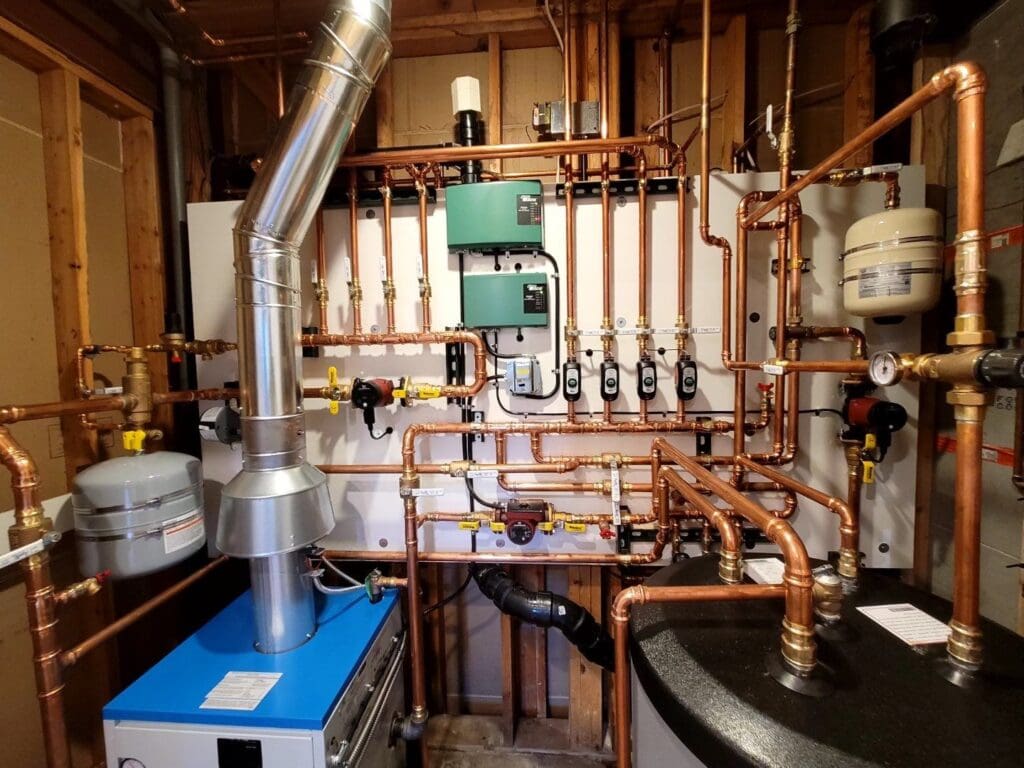
As winter’s icy grip tightens on Colorado, the reliability of your home’s heating system becomes paramount. If you’re considering a boiler replacement, one burning question likely dominates your thoughts: “How much should this cost?” Understanding the factors influencing boiler replacement costs is essential to making a well-informed decision and avoiding unwelcome financial surprises. In this blog post, we’ll explore the key elements that contribute to the overall expense of boiler replacement in Colorado.
Type of Boiler:
The initial factor that significantly impacts the cost of a boiler replacement is the type of boiler you choose. Boilers come in various types, including combi boilers, cast-iron boilers, copper-fin tube boilers, and high efficiency/condensing boilers. Each type has its own set of advantages and considerations, and the cost can vary accordingly. Furthermore, even the same type of boiler can vary in cost relative to the model and features they offer. Combi boilers, for instance, are often more compact and efficient but may have a higher upfront cost compared to conventional boilers.
Boiler Efficiency:
Boiler efficiency, measured by the Annual Fuel Utilization Efficiency (AFUE) rating, is a crucial factor affecting replacement costs. Higher efficiency boilers generally command a higher initial cost but can lead to substantial long-term savings on energy bills. Understanding the efficiency ratings and considering the long-term benefits can help you strike the right balance between upfront costs and future savings.
Installation Complexity:
The complexity of the boiler installation process plays a pivotal role in determining the overall cost. Factors such as the condition of existing pipework, the accessibility of the installation site, and potential alterations to the heating system can influence labor costs. If your home requires extensive modifications or if the installation is particularly intricate, you may incur higher installation expenses.
Brand and Model:
The brand and model of the boiler are significant contributors to the overall cost. Reputable brands with a history of reliability and energy efficiency may have a higher price tag, but they often come with longer warranties and better performance. It’s crucial to strike a balance between budget constraints and the desire for a boiler that offers both reliability and efficiency. Researching customer reviews, warranty offerings, and energy efficiency ratings can guide you in making an informed decision.
Local Labor Rates:
Labor costs for boiler replacement vary by location due to differences in living expenses, demand for heating services, and local regulations. To gauge the average labor rates in your area, obtain multiple quotes from reputable local contractors. While it might be tempting to opt for the lowest bid, consider the contractor’s reputation, experience, and customer reviews to ensure a high-quality installation.
Apples to Apples Comparison:
One of the largest struggles we see homeowners go through is choosing the proper contractor. Replacing your boiler is a HUGE investment. Often, we will go to a customer’s home to find out we are twice the cost of another quote they had. Come to find out, the original contractor is replacing JUST the boiler, while our proposal includes replacing all of the near boiler piping accessories. A boiler room consists not just of the boiler itself, but also pumps, valves, zone valves, controllers, pressure regulators, expansion tanks, and potentially much more. When it comes down to it, most customers get to the point of wanting replacement because they have hit a threshold of repair cost that, in their mind, is too much knowing other things on the boiler could fail. The untrustworthy contractor may offer to just replace the boiler itself because he is giving you a small peace of mind, keeping the upfront cost down while still making some money. This is a disservice to the customer. If all the near boiler piping components are left in place, the customer may not realize it, but they can count on continual repair costs as those other components fail. This is why it is extremely important to make sure that the scope each contractor is providing is apples to apples with each other. If you make this mistake, you may save a few thousand today, to spend a few more thousand the next heating season.
Additional Components:
In some cases, a boiler replacement may necessitate additional components or upgrades. For example, if your existing radiators or pipework are outdated, you might need to invest in replacements or modifications. Upgrading to smart controls or a more advanced thermostat can enhance energy efficiency but adds to the overall cost. Discussing potential additional expenses with your HVAC professional upfront can help you avoid unforeseen costs.
Another VERY common situation we encounter happens at the time of a real estate transaction. Often, the homeowner or a previous homeowner has hired a contractor to replace their boiler, and a permit is not pulled. This leaves everyone downstream at risk. We have seen code issues come up during the sale of a home that can cost thousands. The unlicensed contractor may have installed the boiler improperly, such as piping errors, using the wrong venting materials, lack of combustion air, and much more. These mistakes can cause a homeowner to have thousands in unexpected corrections when the violations are pointed out by a home inspector.
So, How Much Does a Boiler Replacement Cost in Colorado?
Determining the cost of a boiler replacement in Colorado involves considering a myriad of factors, each playing a vital role in the overall expense. By understanding the type of boiler, its efficiency rating, installation complexity, brand and model, local labor rates, and potential additional components/code corrections, you can make an informed decision tailored to your specific needs and budget.
While it’s tempting to focus solely on upfront costs, it’s equally important to weigh the long-term savings associated with energy-efficient boilers. Investing in a high-quality boiler that aligns with your heating requirements and offers long-term efficiency can lead to lower utility bills and enhanced comfort in your home.
Ultimately, consulting with reputable HVAC professionals, obtaining multiple quotes, and researching your options can empower you to make a decision that not only meets your immediate heating needs but also proves to be a wise investment in the future comfort and efficiency of your home. Depending on if you need JUST a boiler replaced or the whole boiler room retrofitted, you could expect to spend between $12,000 to over $30,000 depending on the scope, size of the home, and many other factors mentioned above.



